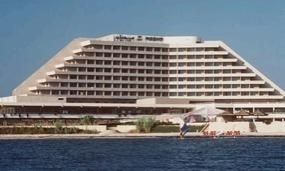Syria’s Ministry of Tourism organised early May a conference to attract local investors interested in developing small and medium-sized hospitality projects.
During the event, held on May 11 and 12, the Ministry offered around 25 projects for development on a Build-Operate-Transfer (BOT) basis.
The projects are properties owned by state or local institutions, such as municipalities, generally hotels, restaurants or bare lands, which are awarded to investors. Investors develop the property for a certain period of time, for instance 10 or 25 years, in exchange for an annual fee they pay to the property’s owner, and keep the profits.
Prior to the uprising, this type of conferences was organised every year by the Ministry of Tourism and served to attract investors to develop large projects such as the building of 5-star hotels in Damascus, Aleppo and other prominent touristic areas.
The government managed then to attract international companies such as Holiday Inn, Intercontinental, Mövenpick and Rotana. These companies were attracted by the growing number of tourists entering Syria, which increased by 40 percent in 2010, the largest annual increase in the world.
However, since then foreign investors have suspended their projects and tourists have left Syria. Consequently, the Ministry wants now to attract local investors and to focus on affordable projects for the local population. Instead of large 5-star restaurants and hotels, most of the projects on offer are for two and 3-star resorts. The Ministry divided the projects into two categories: small projects that require investments of between 10 and 50 million pounds (USD 58-294,000) and medium size projects worth up to SYP 300 million (USD 1.7 million).
Most of these are located in the governorates of Damascus, Lattakia, Tartous and Suweida, which have been the least affected by the war. The safety of these areas has attracted refugees from other parts of the country, some of whom, the Ministry hopes, will want to spend some money on tourism services.
The new strategy of the government may sound intelligent. On the one hand, it expects that Syrians want to resume their normal life and, on the other, it hopes that investors will be willing to invest given the safety of the governorates mentioned.
However, the plan faces several obstacles. The battles in northern Lattakia and around Damascus and Suweida, have confirmed that the safety of these governorates is relative and may not last. As a result, investors may want to wait before committing large amounts of money.
At the same time, the number of Syrians that may use tourism services is very limited. Because of safety fears, Syrians limit their travels outside their cities and homes. Meanwhile, consumers are spending on the necessities of life, such as food and medicines, and not on entertainment, given that their purchasing power continues to decline rapidly.
Investment and consumption, the two engines of economic growth, are unlikely to return soon to Syria’s tourism sector, or to its economy as a whole.
......


